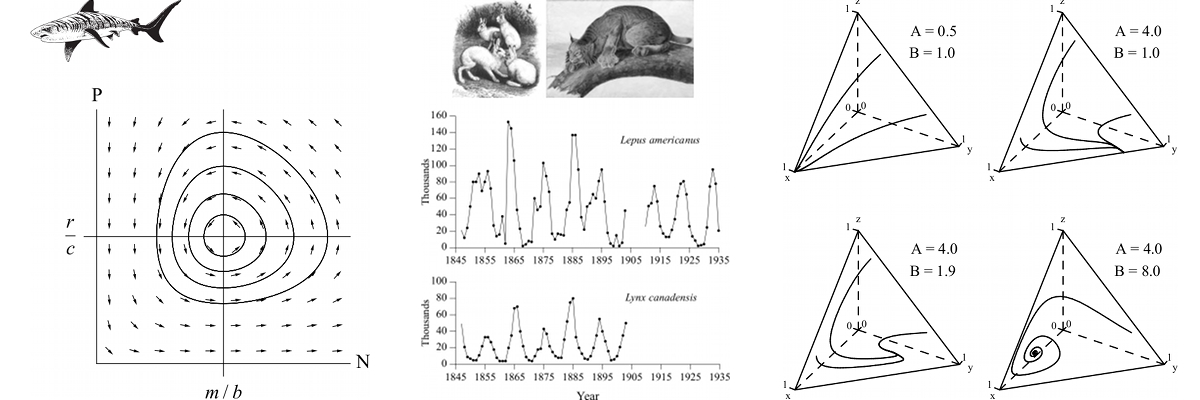| AMATH 535 | Schedule | Instructor | Assistant | Flier | Handout | Content | Textbooks | References | Prerequisites | Grading | Homework | Calendar | Notes |
AMATH 535
Mathematical Ecology
Spring 2011

Schedule
| SLN: | 19581 | |
| Days: | M, W, F | |
| Time: | 1:30-2:20 am | |
| Room: | Sieg 228 |
Instructor
| Name: | Mark Kot | |
| Office: | 415G Guggenheim Hall | |
| Phone: | (206) 543-0908 | |
| Fax: | (206) 685-1440 | |
| Email: | mark_kot@comcast.net |
| Office Hours: | M, W, F, 2:30-3:20 pm |
Assistant
| Name: | TBA | |
| Office: | 407 Guggenheim Hall | |
| Phone: | (206) 685-9395 | |
| Fax: | (206) 685-1440 | |
| Email: | TBA |
| Office Hours: | TBA |
Flier
Here is a
course flier to help you remember this course.Handout
Handout
Content
This course considers models, methods, and issues in population ecology.
Topics include the effects of density dependence, delays, demographic stochasticity,
and age structure on population growth; population interactions
(predation, competition, and mutualism); and applications of optimal control theory
to the management of renewable resources.
Please see the class notes for further details regarding class content.
Textbooks
There is no required textbook.
I will instead provide detailed, typeset lecture notes.References
Helpful Reference Books:
-
Allen, L. J. S. (2007)
An Introduction to Mathematical Biology
Pearson Prentice Hall, Upper Saddle River, NJ. UW Library Catalog -
Brauer, F. and Castillo-Chavez, C. (2001)
Mathematical Models in Population Biology and Epidemiology
Springer, New York, NY. UW Library Catalog -
Britton, N. F. (2005)
Essential Mathematical Biology
Springer, London, UK. UW Library Catalog -
Clark, C. W. (2010)
Mathematical Bioeconomics: The Mathematics of Conservation.
John Wiley & Sons, Hoboken, NJ. UW Library Catalog (1990 edition) UW Library Catalog (1976 edition) -
Edelstein-Keshet, L. (1988)
Mathematical Models in Biology
Random House, New York, NY. UW Library Catalog Edelstein-Keshet, L. (2005)
Mathematical Models in Biology
SIAM, Philadelphia, PA. UW Library Catalog -
Gore, A. and Paranjpe, S. (2001)
A Course in Mathematical and Statistical Ecology.
Kluwer Academic Publishers, Dordrecht, Netherlands. UW Library Catalog -
Hallam, T. G. and Levin, S. A. 1986.
Mathematical Ecology: An Introduction.
Springer-Verlag, Berlin, Germany. UW Library Catalog -
Kot, M. (2001)
Elements of Mathematical Ecology
Cambridge University Press, Cambridge, UK. UW Library Catalog -
Mangel, M. (2006)
The Theoretical Biologist's Toolbox:
Quantitative Methods for Ecology and Evolutionary Biology
Cambridge University Press, Cambridge, UK. UW Library Catalog -
May, R. and McLean, A. (2007)
Theoretical Ecology: Principles and Applications.
Oxford University Press, Oxford, UK. UW Library Catalog -
Morin, P. J. (1999)
Community Ecology.
Blackwell Science, Malden, MA. -
Murdoch, W. M., Briggs, C. J., and Nisbet, R. M. (2003)
Consumer-Resource Dynamics.
Princeton University Press, Princeton, NJ. UW Library Catalog -
Murray, J. D. 2002 (3rd Edition)
Mathematical Biology I: An Introduction
Springer, Berlin, Germany UW Library Catalog -
Renshaw, E. (1991)
Modelling Biological Populations in Space and Time.
Cambridge University Press, Cambridge, UK. UW Library Catalog -
Yodzis, P. (1989)
Introduction to Theoretical Ecology.
Harper & Row, New York, NY.
Prerequisites
Amath 402 or Amath 423 or permission of the instructor.
Grading
Homeworks account for 70% of the final grade.
Your take-home final accounts for 30% of the final grade.Homework
Homework are due one week from the date of assignment.
Homeworks constitute 70% of the final grade. Write up your homework alone, not as a group!
-
Homework #1.1 (Due: Monday, April 4, 2011)
hw_1.1.pdf -
Homework #1.2 (Due Wednesday, April 6, 2011)
hw_1.2.pdf -
Homework #1.3 (Due Friday, April 8, 2011)
hw_1.3.pdf -
Homework #2.1 (Due Monday, April 11, 2011)
hw_2.1.pdf -
Homework #2.4 or #2.5 (Due Wednesday, April 13, 2011)
hw_2.4.pdf
hw_2.5.pdf -
Homework #3.1 (Due Friday, April 15, 2011)
hw_3.1.pdf -
Homework #3.6 (Due Friday, April 22, 2011)
hw_3.6.pdf -
Homework #3.7 (Due Friday, April 22, 2011) -- Extra Credit
hw_3.7.pdf -
Homework #4.1 (Due Monday, April 25, 2011)
hw_4.1.pdf -
Homework #4.3 (Due Wednesday, April 27, 2011)
hw_4.3.pdf -
Homework #4.4 (Due Friday, April 29, 2011) -- Extra Credit
hw_4.4.pdf -
Homework #6.2 (Due Friday, May 6, 2011)
hw_6.2.pdf -
Homework #6.3 (Due Wednesday, May 11, 2011)
hw_6.3.pdf Homework #7.1 (Due Monday, May 16, 2011)
hw_7.1.pdf Homework #7.3 (Due Friday, May 20, 2011)
hw_7.3.pdf Homework #9.1 (Due Wednesday, June 1, 2011)
hw_9.1.pdf Take-Home Final Exam (Due Monday, June 6, 2011, 2:30 pm)
final.pdf . . .
Calendar
Important Dates
| Monday | March 28 | First Day of Classes |
| Friday | May 27 | Take-Home Final Available |
| Monday | May 30 | Memorial Day (No Class) |
| Friday | June 3 | Last Day of Lectures |
| Monday | June 6 | Take-Home Final Due (2:30 pm) |
Notes
- Simple population growth models
- Harvest models: bifurcations and breakpoints
- Stochastic birth and death processes
- Discrete-time models
- A Classcial Predator-Prey Model
- To Cycle or Not to Cycle
- Overheads: Predator-Prey Models
- Overheads: Discrete-Time Predator-Prey Models
- Competition models
- Mutualism models
- Harvest models and optimal control theory
- An overview of linear age-structured models

|